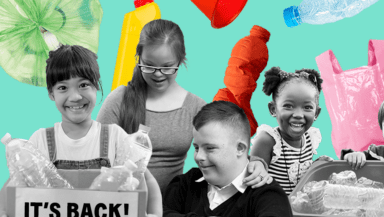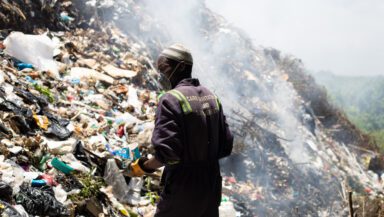The full extent of UK supermarket giants’ contribution to our plastic waste problem is exposed today by the most comprehensive analysis of the sector to date.
Drawing on detailed figures disclosed by firms for the first time, the survey of Britain’s largest supermarkets and grocery chains reveals ten major retailers are placing over 810,000 tonnes of single-use plastic on the market every year. Seven of them are putting in circulation the equivalent of some 59 billion pieces of plastic packaging – over 2,000 items for every household in the country [1].
Despite their huge plastic footprint, half of the supermarkets surveyed have no specific targets to reduce plastic packaging and most of those who do are moving at such a slow pace (just 5% per year) that it would take them 20 years to completely rid their shelves of throwaway plastic.
The survey by the Environmental Investigation Agency (EIA) and Greenpeace UK also ranks retailers based on their commitments to reduce single-use plastic, eliminate non-recyclable plastic packaging, engage with supply chains and transparent reporting. Iceland comes out ahead of the pack thanks to an ambitious plan for phasing out own-brand plastic packaging within five years, while most major retailers, including Tesco and Asda, are lagging further down the scoreboard, with Sainsbury’s at the bottom of the league.
Click here to download the ranking infographic
Following a series of announcements from retailers about their action on plastic waste, the survey aimed to establish how far supermarkets are actually going in tackling the problem. It found that:
- On top of the plastic packaging already mentioned, the ten leading supermarkets are also producing 1.1 billion single-use bags, almost one billion bags for life and 1.2 billion plastic produce bags for fruit and vegetables;
- Many supermarkets have not yet adopted plastic-specific reduction targets, including Aldi, Co-op, Sainsbury’s, Tesco and Waitrose;
- Only four supermarkets offer customers some options to use refillable containers – an effective way to reduce single-use packaging. There remains considerable scope for supermarkets to scale-up refillable and unpackaged product ranges;
- In general, retailers are focusing more on recycling than reduction, and even here, most have only committed to eliminate non-recyclable plastic packaging by 2025. Co-op tops the leaderboard for share of own-brand products that are widely recyclable (79%), while most others fall behind with around a third of their plastic (by weight) not widely recyclable;
- Despite branded goods making up as much as 60% of retailers’ plastic packaging, few retailers were able to provide evidence that they’re using their buying power to push big consumer brands to reduce their plastic footprint;
- Many supermarkets have taken action to end sales or provision of disposable items such as straws, cutlery and cotton buds, ahead of a planned Government ban, and many are also committed to phasing out the most problematic forms of plastic, such as PVC, expanded polystyrene and black plastic, within the next two years. But no supermarket has pledged to completely remove plastic that can’t be recycled from its shelves before 2022;
- Ocado was the only major grocery retailer who refused to participate in the survey, along with the convenience chains, Spar, Premier Stores, Londis, Lifestyle Express and Best-One.
Commenting on the findings, Greenpeace UK Oceans Campaigner Elena Polisano said:
“Plastic pollution is now a full-blown environmental crisis and our supermarkets are right at the heart of it. Much of the throwaway plastic packaging filling up our homes comes from supermarket shelves, but high-street giants are still not taking full responsibility for it.
“So far most retail bosses have responded to growing concern from customers with a pick-and-mix of different plastic announcements, but have failed to come up with the coherent plastic reduction plans required to solve this problem.
“The success of the plastic bag charge shows big retailers can crack down on plastic waste if they really mean to. Every little may well help, but if we are to protect our natural world and ourselves from pervasive plastic pollution, supermarkets need to check out on throwaway plastic fast.”
Commenting on the findings, Sarah Baulch, EIA Senior Ocean Campaigner, said:
“Decisions taken by supermarkets today are resulting in thousands of plastic items flooding British homes every year. Despite public pressure for action on plastic being at an all-time high, our survey shows that UK supermarket giants are failing to keep up. With just seven supermarkets putting over 59 billion pieces of plastic packaging through their tills every year, the true scale of their footprint is now becoming apparent.
“It is abundantly clear that we cannot simply recycle our way out of the plastic pollution crisis, and yet this remains the priority area of focus for many major chains. Retailers must pioneer new ways to reduce their plastic footprint across the entire supply chain. Waste from the UK impacts wildlife and communities around the world and it’s high time that supermarkets move beyond incremental change and fundamentally rethink their relationship with single-use plastic packaging.”
Plastic production has soared twentyfold in the past half-century and, at the current rate, is expected to quadruple by 2050.
In the UK, the grocery retail sector is the largest user of plastic packaging, accounting for over half of the 1.5 million tonnes of consumer plastic packaging used in retail every year [2].
In June, a Populus poll showed 91% of the UK public believe supermarkets should be working to reduce the amount of overall packaging they use, while nearly three-quarters (72%) think big retailers are not doing enough about plastic packaging to tackle the problem of plastic pollution.
Over 740,000 people have signed a Greenpeace petition urging supermarkets to ramp up efforts to reduce throwaway plastic.
Greenpeace and the EIA are calling on supermarkets to:
- Set year-on-year targets to reduce their single-use plastic footprint;
- Urgently eliminate unnecessary and non-recyclable plastic packaging by the end of 2019;
- Introduce transparency by publishing yearly audits of single-use plastic use.
ENDS
MEDIA CONTACTS
Stefano Gelmini, Greenpeace UK Head of news, sgelmini@greenpeace.org, 020 7865 8114
Luke Pickering, EIA Head of Comms, lukepickering@eia-
EDITORS’ NOTES
1. Seven supermarkets were transparent in providing unit data for their total plastic packaging footprint across branded and own-brand products – Aldi, Iceland, Lidl, M&S, Sainsbury’s, Tesco and Waitrose, which combined accounted for more than 59 billion items.
2. Source: WRAP, 2018. Plastic Flow 2025: Plastic Packaging Flow Data Report (Page 1, figure ES1). Available at: http://www.wrap.org.uk/sites/
The survey
In May 2018, the Environmental Investigation Agency (EIA) and Greenpeace UK sent a survey to the UK’s 11 largest supermarkets by market share and six grocery chains with over 1,000 stores under their brand. Ocado and the convenience chains Spar, Premier Stores, Londis, Lifestyle Express and Best-One did not respond.



